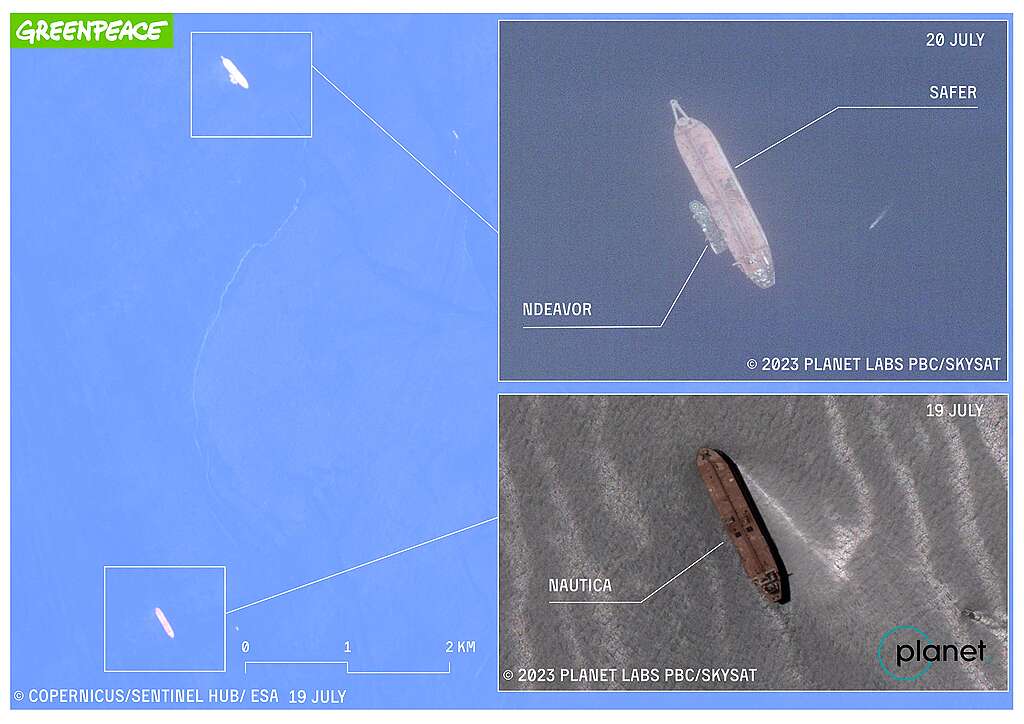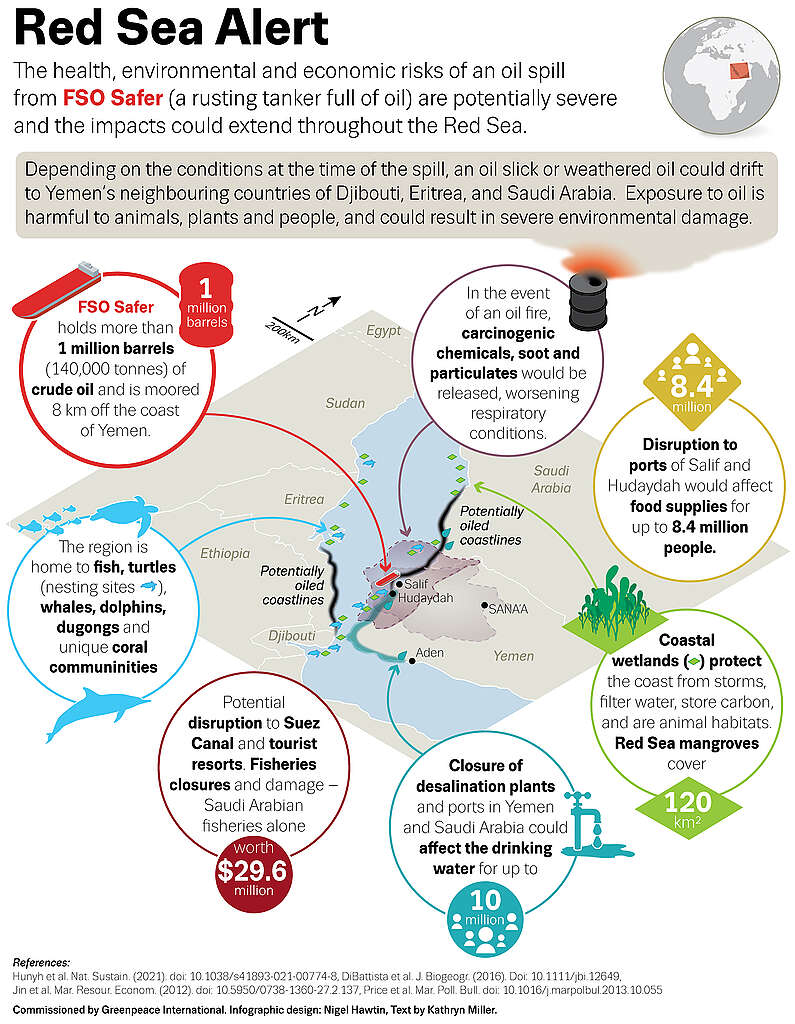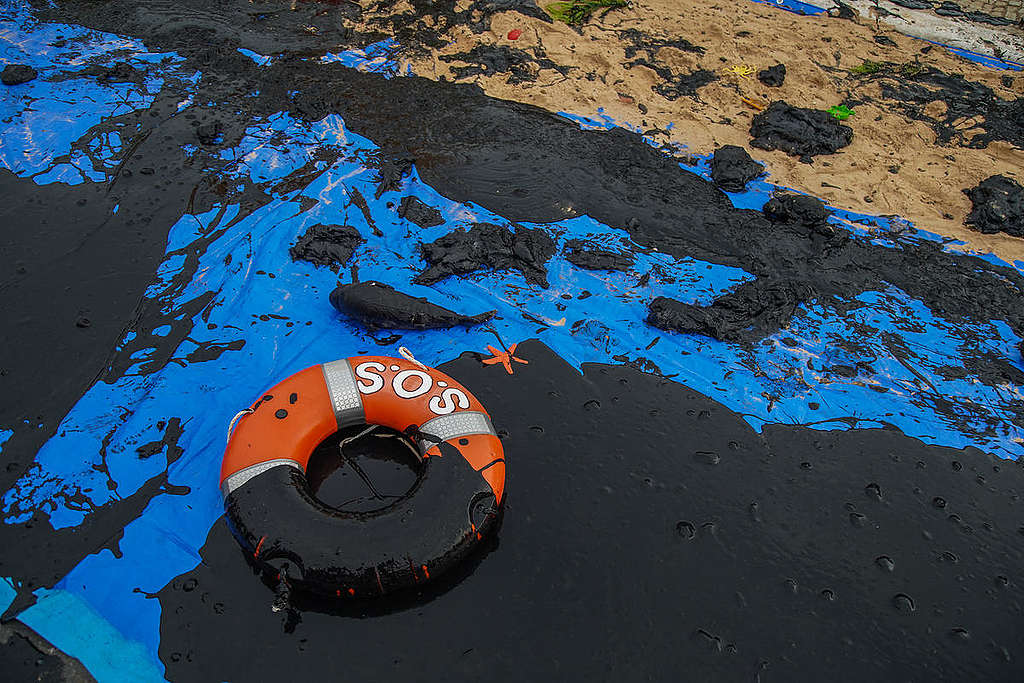After more than eight years and numerous false alarms, the hazardous operation to remove more than a million barrels of oil from the decaying supertanker the FSO SAFER, in the Red Sea off the southern coast of Yemen, is poised to begin.
 Satellite pictures showing rescue vessels NDEAVOR and NAUTICA (now renamed YEMEN) alongside the FSO SAFER off the coast of Yemen, in the Red Sea, on the 19th and 20th of July 2023. © Greenpeace / Planet Labs PBC 2023
Satellite pictures showing rescue vessels NDEAVOR and NAUTICA (now renamed YEMEN) alongside the FSO SAFER off the coast of Yemen, in the Red Sea, on the 19th and 20th of July 2023. © Greenpeace / Planet Labs PBC 2023Why is this a big deal, you may ask? Allow me to paint you a picture
Imagine a silent danger lurking on the waves, unknown to most of the world. This danger, known as the FSO SAFER, is a massive Floating Storage and Offloading (FSO) facility that was neglected off the coast of war-torn Yemen in the Red Sea from 2015 until a few weeks ago.
During the intervening years it is only the heroic efforts of a small skeleton crew and a great deal of luck that disaster has not happened. There was much relief when a salvage crew arrived in June to lay the groundwork for the oil transfer to the crude carrier, NAUTICA, now renamed YEMEN.
Greenpeace has tirelessly advocated for action on the FSO SAFER crisis since the beginning. We’ve raised global awareness about the imminent environmental and humanitarian threats, urging for immediate measures to avert a potential catastrophe.
This is a vitally important mission and not without its risks. The deteriorating condition of the FSO SAFER is a ticking time bomb that threatens to worsen the humanitarian crisis in Yemen and trigger an environmental disaster. You can’t just leave a million-plus barrels of oil sitting in a tanker like this. Without regular maintenance the risk of a leak or explosion is high.
A rupture in the vessel’s single-skin hull or an explosion could lead to a spill up to four times greater than the infamous Exxon Valdez oil spill in 1989. Such a catastrophe would seriously exacerbate what is already considered the worst humanitarian crisis in the world, preventing access to the vital ports of Hodeidah and Salif and impeding the delivery of much-needed aid and food supplies.
Fortunately, the chance of avoiding such a catastrophe is now better than it’s been in years.
An oil spill in the Red Sea would be nothing short of an environmental and humanitarian catastrophe, impacting fragile coastal communities, the tourism industry, and marine life. The consequences would be felt far beyond Yemen’s borders, with devastating effects on health, livelihoods and ecosystems.
 © Greenpeace / Design: Nigel Hawtin. Text by Kathryn Miller.
© Greenpeace / Design: Nigel Hawtin. Text by Kathryn Miller. ‘Who is responsible for this?’ you rightly ask
Well, it can’t be said with 100% certainty (and the culprits aren’t going to volunteer themselves) but there are more than a few prime suspects.
From 2010 to 2015, there were 13 operating oil assets (oil and gas-condensate fields) from five blocks in the Marib Basin, in Yemen’s southwest. It’s therefore likely that those responsible for the oil currently on board the FSO SAFER are among the Marib basin producers and their subsidiaries and shareholders from the five blocks that fed the pipeline to FSO SAFER. They are Occidental, OMV, Sinopec Group, TransGlobe Energy Corporation, ExxonMobil and TotalEnergies.
These transnational polluters should be paying the estimated US$140 million cost of the salvage operation. Instead, UN members, the private sector and individuals from all over the world have contributed US$121 million, with another estimated US$22 million needed.
It may seem like a lot of money but the cost is nothing to oil companies making record profits e.g. TotalEnergies, one of the companies that used the SAFER, in the first quarter of this year announced a cash flow of over US$9 billion and the figure seems even more paltry when contrasted with the estimated US$20 billion cost of an oil spill. A cost that polluters should pay.
Occidental, OMV, Sinopec Group, TransGlobe Energy Corporation, ExxonMobil and TotalEnergies are among the most polluting corporations in the world and they should be paying not just for this salvage operation but for their historical contribution to climate change and future extreme weather events. These corporations and others like them should commit to providing annual payments to compensate communities directly and indirectly impacted by their operations.
Yemen’s coastal communities who depend on the sea for their survival, relying on fishing as a primary source of income, should not be the ones to pay for Big Oil’s disregard for human life and the environment. An oil spill would devastate these communities, destroying their limited livelihoods and plunging them further into poverty.
As things stand there won’t be a happy ending to this story but a catastrophic one can be avoided. The oil transfer is not without risk but it’s the best shot in a long time at easing at least one threat that the people of Yemen are facing.
The FSO SAFER also serves as a stark reminder of the need to shift away from our reliance on fossil fuels and the corporations so willing to roll the dice with lives and livelihoods. The oil industry must take responsibility for its contribution to the climate crisis, pay financially for the damage done, and adopt ambitious measures to transition to cleaner, sustainable energy sources.

Don’t look away from the people of Yemen and the Red Sea. Tell oil companies that polluters must pay, not people
Ghiwa Nakat is the Executive Director of Greenpeace Middle East North Africa.

 1 year ago
63
1 year ago
63


